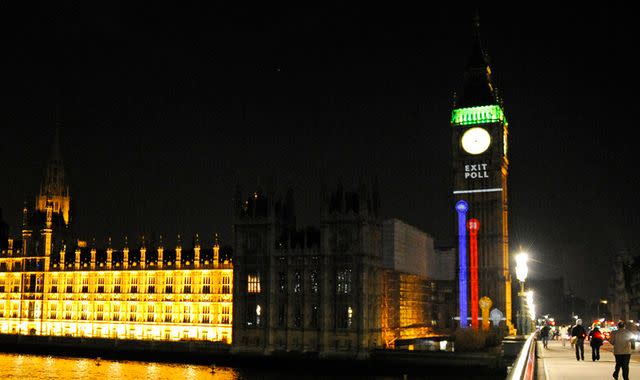Exit polls: How accurate are they? The science of predicting the outcome of an election

It is the first big moment of election night. The exit poll is the moment millions tune in for a first sniff of the eventual result of the general election.
And in Election 2024 this poll, with its impressive track record, sometimes down to a margin of only a few seats, will, once again, be a key part of broadcasters' coverage - including here at Sky News - on Thursday night.
The current model was devised in 2005 by Professor John Curtice and statistician David Firth and it has been consistently reliable, bar 2015 when the seat numbers suggested a hung parliament and David Cameron scraped a thin majority.
But for the most part, its accuracy has been dependable. In 2010, it correctly predicted the exact number of seats for the Conservatives.
Commissioned by the broadcasters - Sky News, the BBC and ITV News - the fieldwork is carried out by IPSOS UK who will have interviewers at 133 polling stations around the country this year.
People who have just voted will be asked to privately fill in a replica ballot paper and place it into a ballot box as they leave their local community centre, church hall or station.
Michael Clemence, from IPSOS UK, says this and the scale are part of what distinguishes the exit poll from the many surveys that have come before it.
"We're going to be doing over 17,000 interviews on the day. And also we're dealing with people's behaviour. So we're not asking people how they intend to vote.
"We're talking to electors who just voted. And I'm asking exactly what they just did. So you've cut out the error in prediction polling."
Researchers can only deploy to a fraction of the total constituencies in England, Scotland and Wales, so locations are chosen to best reflect the demographics of the country with an urban and rural spread.
However, many of the locations will be in marginal seats, where the swing between the main parties will be tracked.
The same polling stations are targeted year after year so the swing from the last election's exit poll, along with other data at constituency level, can be analysed by those crunching the numbers.
👉 Tap here to follow Politics at Jack and Sam's wherever you get your podcasts 👈
The data collected at the polling stations is sent back by interviewers to IPSOS UK at several stages throughout the day.
It's processed there and sent via a secure data pipeline to the broadcasters' statisticians and political scientists who are locked down in a secret location in the capital.
Phones confiscated in 'the bunker'
"Our phones are taken away from us, there are security guards. So we don't communicate with the outside world at all, we just talk to each other. So it's a very strange feeling - as people are still going to the polls - already having a sense of what the result will be," says Professor Will Jennings.
The Sky News election analyst and political scientist will be one of those inside that sealed and secret room on election day - and the key thing experts will be looking at is that change in voter behaviour.
"We'll model the change in the vote at each of those polling stations, and we'll try and look for patterns in that change and also particular characteristics of constituencies that might predict change and might predict what we're seeing across the country," says Prof Jennings.
Read more:
'You wouldn't believe the amount of dicks': Secrets of a ballot counter
How Reform fares will also determine the Tories' fate
"We will throw a lot of different variables at the data during the day, whether it's the percentage of the local constituency that we think voted leave in the referendum, the number of people in working class jobs, the number of people who own a car, for example, it could be anything," adds Prof Jennings.
"And we'll try just to look for patterns in that data to explain as much variation as possible so that we know that our estimates are as reliable as they can be."
By 10pm their work is done - and the fruit of that data gathering and analysis - the first real glimpse of the electorate's verdict - is being digested and picked apart.

 Yahoo News
Yahoo News 
